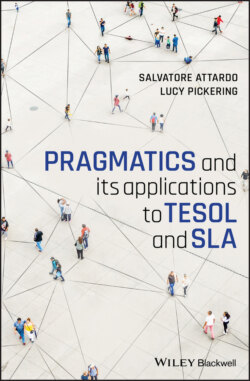Читать книгу Pragmatics and its Applications to TESOL and SLA - Salvatore Attardo - Страница 34
3.1 Ordinary Language Philosophy, Oxford, and Austin
ОглавлениеWhen considering the work of Austin, Searle, Grice, and their numerous followers, it is always good to remember that their formation belongs to the philosophical movement known as “ordinary language philosophy” associated with Oxford University, in England, and of which Austin was the first proponent. While both Searle and Grice disassociated themselves from ordinary language philosophy and moved on to considerations that are very different from it, there remains in their writings a clear influence from Austin.
Simply put, ordinary language philosophy starts from the assumption that language can tell us a lot about the way “things are.” After all, language encodes and reflects the experiences of many generations who have been interacting with reality. It would be very odd if it turned out to be that they had developed a tool to describe and affect reality that turned out to be completely wrong. Needless to say, this does not mean that language is a perfect match for reality, no one has ever claimed that, since after all there are countless examples of language lagging behind the discoveries of science (e.g., we say that the moon and the sun rise and set, which are relics of the Ptolemaic view of the universe with the earth at the center of the universe; whales and dolphins are often categorized as fish, while in reality they are mammals; tomatoes are considered a vegetable, while they are scientifically a fruit, etc.). If we move to social constructs such as institutions (kinship, laws, rituals) or beliefs (courage/fear, happiness/sadness, love/hate) that have no (or little) “empirical” existence outside of the social fact, the argument that language can tell us about reality becomes much stronger. Consider our earlier example of money: without the social agreement that we will exchange goods for printed paper of a certain kind, color, shape, and so on, it makes no sense at all to ask ourselves why a 10 dollar bill is valuable. The value of the 10 dollar bill comes from its use within the community as a 10 dollar bill. The meaning of words, sentences, and so on similarly comes from the same kind of social convention.
One of the most significant influences on ordinary language philosophy is the later Wittgenstein of the Philosophical Investigations, in which one finds remarks such as “the meaning of a word is its use in language,” which are very far from the critical attitude that most philosophers had toward ordinary language, which was seen as the source of error and confusion, to be replaced by the “better” language of logic. Wittgenstein, on the contrary, argues that the meaning of, say, “dog” is just the ways in which speakers use the word “dog,” and nothing else. He also introduces in his latter work the concept of “language game” (Sprachspiel), which is a type of activity that speakers engage in, such as
Giving orders, and obeying them–
Describing the appearance of an object, or giving its measurements–
Constructing an object from a description (a drawing)–
Reporting an event–
Speculating about an event–
Forming and testing a hypothesis–
Presenting the results of an experiment in tables and diagrams–
Making up a story; and reading it–
Singing catches–
Guessing riddles–
Making riddles–
Making a joke; telling it–
Solving a problem in practical arithmetic–
Translating from one language into another–
Asking, thanking, cursing, greeting, praying.
(Wittgenstein, 1953, pp. 11–12; paragraph 23)
Significantly, Wittgenstein claims that there are “countless” kinds of language games, each with its own set of rules. Searle will directly address the issue of the multiplicity of language games. The notions of speech act and of language game are also found in Levinson’s activity type (Levinson, 1979, 1992; see Section 8.3.4).1
